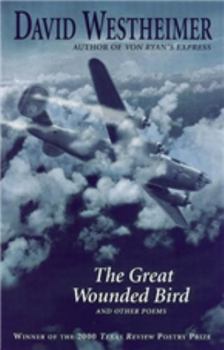The Great Wounded Bird: Poems
If World War II is ancient history to you, The Great Wounded Bird may let you know just what it was like to be in it. What it feels like to drop bombs on strangers, swim out of a bomber, not to really understand war even though you're in one. You'll learn how young men in frightening situations do things they never thought they would be obliged to do, who come to accept danger and hardship as a normal way of life and accept extraordinary events as something they had signed up to endure without question because millions of young men just like themselves had done so. Learn that being in combat had its carefree moments, that being a prisoner of war behind barbed wire was not always grim, that the enemy was not always evil, that the camaraderie of shared peril is stronger than blood ties. All this without the reader ever having heard a shot fired in anger. Westheimer takes you with him to Brazil; across the South Atlantic to the Gold Coast of Africa; to Khartoum, across the Sahara to Palestine; to Haifa, Cairo, Tobruk, Benghazi and Tripoli; to Beirut and Damascus; and to prison camps in Italy and Germany. And in the prison camps you will meet Padre Brach, the Catholic chaplain who refused repatriation, and Feldwebel Gemnitz, the chief German guard at Stalag Luft III, who after the war was brought, all expenses paid, to a reunion of his former charges.
Format:Paperback
Language:English
ISBN:1881515281
ISBN13:9781881515289
Release Date:July 2000
Publisher:Trp: The University Press of Shsu
Length:80 Pages
Weight:0.33 lbs.
Dimensions:0.3" x 5.4" x 8.5"
Customer Reviews
2 ratings
A memorable, strongly recommended collection of poems
Published by Thriftbooks.com User , 24 years ago
In The Great Wounded Bird And Other Poems, David Westheimer (winner of the 2000 Texas Review Poetry Prize) presents a memorable, strongly recommended collection of poems about the experiences of men in a time and place of war. Poggio Mirteto: RAF bomber crewman are in the room next to ours/At Poggio Mirteto, the Italian quarantine prison./When we try to talk to them through the wall,/They do not trust us./We might not be what we claim./But when the sing, "That was a cute little rhyme,/sing us another one, do," and we do,/We pass their test, genuine Yanks. We sing/"Sixpence" through the wall./"I've got sixpence to last me all my life."/Our American version innocent,/The British version dirty,/So we adopt theirs.
Their tales still need to be told
Published by Thriftbooks.com User , 24 years ago
This review first appeared in DR AHEAD, the newsletter of the Air Force Navigators Observers Association (AFNOA). AFNOA Member Westheimer (Turner 42-04)is one of the most successful writers of America's World War II generation, most famous for VON RYAN'S EXPRESS. However, for purposes of this review, two other books by him are notable: SITTING IT OUT, his 1992 memoir about being a prisoner of war in Italy and Germany, and SONG OF THE YOUNG SENTRY, a 1968 fictionalized verson of the same experiences. In this volume of 56 short, crisp poems written in free verse (Westheimer says that it is really prose set up to look like poetry), the author revisits his memoir. The result is a wonderfully moving reading experience. For example, here is part of the poem called "Lucky": "Sometimes I think how lucky I was To be captured instead of killed. Out of harm's way, mostly, For two years."Or the first lines of the first poem, "Old Man," which says why this retelling of long past events in important: "Men are dying old That I knew young. Their tales all told, Their songs all sung." Yes, the "greatest generation" is dying, but their tales still need to be told, and Westheimer does it with power. This is a poetic history of the crew of a B-24 who go to war in 1942 via the southern route, their navigator guiding them from Florida to Natal across the Atlantic and Africa to Khartoum and Palestine. Described in "The Southern Route": "Every hour I shoot a three-star fix - Antares, Vega, Altair, Peacock, Fomalhaut, Deneb, Alpheratz"From Palestine, they fly combat missions against targets in North Africa, the Mediterranean, and finally, for them, Italy where, still in 1942, they are blasted out of the sky.Most of the story is about life in prison camps and the people on both sides of the wire, first in Italy and then, after Italy switched sides, Germany. Before that we get a taste of what it was like for young Americans on leave in such places as Beirut, Damascus, and Cairo. Liberation is a special experience and then there are hints of a long lifetime of memories. THE GREAT WOUNDED BIRD is one evening of readind, but I have gone back into it several times. It also led me into reading Westheimer's three books which are memtioned above. All provide useful and somewhat unusual insights into the expereince of being a prisoner of war. It's educational, but, just as important, good, fun reading.





